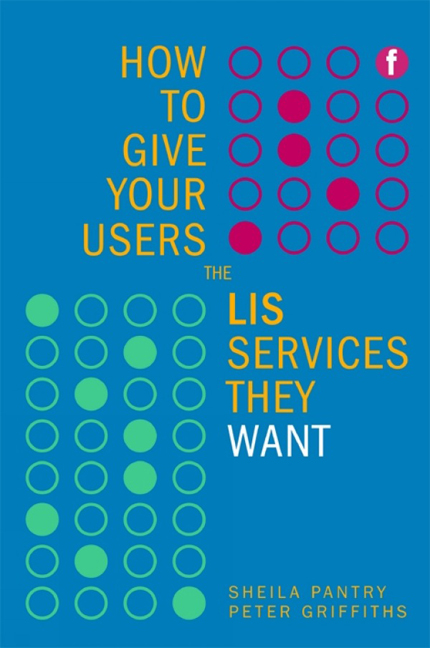Book contents
- Frontmatter
- Contents
- Preface
- 1 Why this book?
- 2 Understanding users – the what, why, where, when, how and who
- 3 What is the current knowledge about your users and their needs – is it really predictable?
- 4 Great expectations: how LIS professionals can manage and train users
- 5 Using information about past user behaviour
- 6 Making the most of knowing your users
- 7 Keeping track of changes in what users want
- 8 Tracking the future
- 9 Future perfect?
- Appendix 1 Reading list and references
- Appendix 2 Where to go for further information
- Index
5 - Using information about past user behaviour
Published online by Cambridge University Press: 08 June 2018
- Frontmatter
- Contents
- Preface
- 1 Why this book?
- 2 Understanding users – the what, why, where, when, how and who
- 3 What is the current knowledge about your users and their needs – is it really predictable?
- 4 Great expectations: how LIS professionals can manage and train users
- 5 Using information about past user behaviour
- 6 Making the most of knowing your users
- 7 Keeping track of changes in what users want
- 8 Tracking the future
- 9 Future perfect?
- Appendix 1 Reading list and references
- Appendix 2 Where to go for further information
- Index
Summary
In this chapter we look at:
➡ the value of information about past user behaviour
➡ the content of library surveys, and how this influences the way that users respond
➡ what the results of your information audit may tell you about user needs
➡ how to use the results of surveys to adjust services
➡ how to use the results of surveys to decide whether to close services or create new ones
➡ the value of information over time.
The value of information about past user behaviour
What information do you already hold about your users and what can you learn from it? Past behaviour is no guarantee of future behaviour, of course, so is it worth keeping old data? There may be changes in the size or composition of your user group, and older reviews are unlikely to cover some of the services your LIS now offers, just as they may include some services that have since closed. Historic data will of course allow you to paint a picture over time of how the LIS is used, and how users regard it and its services, allowing you to track trends and comparative figures to support business cases and help with fund allocation. But there is also great value in reading the detail, because of what it tells you about the way that users have interpreted the questions put to them. You may be able not only to identify areas where jargon or lack of understanding is confusing your users (and maybe dissuading them from asking the LIS to provide a new service you would like to offer) but also gain understanding about the way that your users work and how they involve the LIS in that work.
An important byproduct of reviewing what you already know will be to highlight other information stores in your organization, and this may lead you to consider whether these should be brought within your library and information service, or whether you should influence their management in any other appropriate ways.
Library surveys
Do you issue library surveys? Many libraries do, not only to discover what users require, but in order to decide what services to provide and in order to allocate budgets to them.
- Type
- Chapter
- Information
- How to Give Your Users the LIS Services They Want , pp. 61 - 72Publisher: FacetPrint publication year: 2009



